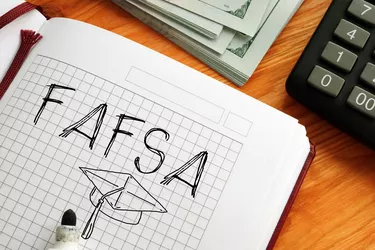
The amount of financial aid a college student is eligible to receive is based on the data the student or his family provides in the Free Application for Federal Student Aid (FAFSA). Both income and assets play a role in the amount the family is expected to contribute. A savings account does count as an asset, but the effect depends on the type of savings account and who is listed as the owner.
Consider also: 5 Useful Apps for Paying off Student Loans
Video of the Day
Video of the Day
Type of Savings Accounts
The type of savings account you have will affect the amount of money you are expected to pay for college. A traditional savings account or money in a brokerage account will decrease the amount of financial aid you are eligible for the most. Education-specific savings accounts like a 529 plan or an educational savings account (ESA) will have a smaller effect.
You might wonder, "Does a child Roth IRA affect financial aid?" Retirement savings accounts for both minors and adults will have no effect on the FAFSA for calculating your expected family contribution.
Consider also: Which Comes First: Saving for a House or Retirement
Effect of a Savings Account
If the student has assets in a traditional savings account, his expected contribution will typically increase by 20 percent of those assets. For example, if the expected contribution was $5,000 without a savings account, it would increase to $7,000 if he had $10,000 in a savings account.
Money in a 529 account, on the other hand, will only increase the amount the family is expected to pay by 5.64 percent of the amount in the savings account. Thus, in the example above, if the $10,000 was in a 529 plan rather than a savings account, the expected contribution would be $5,564.
Reducing Your Savings
You might wonder, "Does FAFSA check your bank account balance?" While the government doesn't do this, you still might want to take steps to reduce your savings before applying for aid. That's because the FAFSA application asks you to report current account balances.
For example, if you've earmarked the money in your savings account for certain non-college related expenses, it's smart to make those purchases before you file the FAFSA. If you've been saving for a car to get you back home for the weekends, you should buy it sooner rather than later.
Using the money in your savings account to reduce other consumer debt that you have, such as credit card debt, before filing the FAFSA means it won't be available to be considered as part of your expected contribution.
Consider also: Examples of Personal Assets
Parent vs. Student Name Assets
Assets in the student's name have a bigger impact on financial aid than those in the parents' names, since the needs analysis usually shelters some of a parent's assets, while it expects the student to spend her money on her education. In addition, the assets protected can depend on both marital status, dependents and age.
For example, if you have a low income, you might end up having all your assets excluded, while the typical asset amount protected is around $17,000 per family. If you're an independent student, the assets that count can range from seven percent if you have a child to 20 percent if you have no child.
If possible, you might move assets from accounts in the student's name to custodial accounts like a 529 plan before filing the FAFSA.